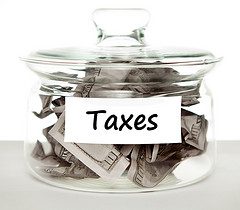There are many tax breaks that get overlooked, but homeowners often overlook the most obvious deductions. The truth is, as a homeowner, you stand to save hundreds if not thousands off your taxes. However, it all boils down to knowing what you qualify for. The following are just some of the tax breaks homeowners may be missing out on.
Mortgage Interest
The interest you pay on your mortgage should be one the first tax breaks you take advantage of. Those filing single can deduct mortgage interest on homes up to $500,000 ($1 million for married couples). This will require a bit more work because you will need to itemize your deductions, which means you should see an accountant.
Points
Sometimes people are required to pay points on their mortgage to get better rates on their loan. These points may offer a tax break if they meet certain requirements. First of all, points must be allowed in the area where the home was purchased. Second, the mortgage must be for a home that is being bought or built as a main residence. The deduction must also be taken the year the loan to buy a home was obtained and the points cannot be out of the normal range.
Property Taxes
Each year, for as long as you own your home, you can deduct the amount of your property taxes. With most loans these taxes make up a percentage of your monthly payment and are set aside to be paid once a year. You will receive information on the cost of these taxes when you receive information about the interest from the lender.
Mortgage Forgiveness
The Mortgage Forgiveness Act extends through 2012 and allows those that fell into foreclosure the ability to not pay taxes on the forgiven amount. In most cases, forgiven debt is taxed as income. Those that restructured their loan also qualify. The amount forgiven is up to $2 million for married couples and $1 million for single homeowners.
Tax-Free Capital Gains
A capital gain occurs when something is sold for a profit. With most capital gains, the seller is taxed on the amount gained. However, with residential real estate, the homeowner may qualify for a tax break on the first $250,000 ($500,000 if married) of the gain.
Energy Saving Improvements
Last, but certainly not least, homeowners making improvements to their property, in order to have a more energy efficient home, can also take advantage of tax breaks. There are a number of items that qualify ranging from windows to roofing and you may be able to deduct up to 30% of the costs from your taxes up to $1500.
As a homeowner, it pays to take advantage of these tax breaks. While this may mean getting the assistance of a professional accountant, it also means saving hundreds, if not thousands, of dollars.
About the Author: Dennis Allenbaugh is a mortgage specialist who loves seeing people benefit from homeownership each year. He recommends sites like Home Loans Australia and others to those looking to qualify for a home loan. Now’s the time to start thinking about purchasing a home.









